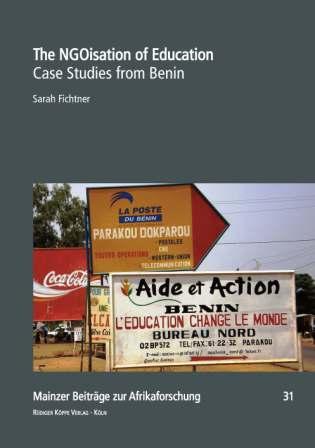


The NGOisation of education is an outcome as well as a means of the globalisation of public services that increased tremendously during the peak of neoliberal global governance in the ‘long 1980s’. Non-governmental organisations, with the comparative advantages seen by international development agencies as being closer to the ‘target populations’, less corrupt and more efficient than state institutions, became the preferred project implementers in public sector domains since that time.
Based on insights from the West African country Benin, this thesis studies the processes of the NGOisation of education from an empirical perspective. It focuses on four case studies, namely
1. the Primary Education Teacher’s Training Programme carried out by the INGO IFESH;
2. Aide et Action’s installation of a Municipal Education Committee in Nikki;
3. the Education First Project against child trafficking conceptualised by World Education, Terre des Hommes and the Catholic Relief Services; and
4. a project for self-managed school canteens run by the Catholic Relief Services.
The projects’ analyses are grounded in ten months of multi-sited field research in Nikki, Karimama, Parakou, Cotonou and Porto Novo.
The main argument is that currently, NGOs’ development aid involves foremost the promotion, marketing, and management of global models, norms and standards in the field of education, and to a much lesser extent the provision of resources and services to ‘the poor’. This development-driven promotion of norms, defined as shared, evaluative expectations of behaviour of how the beneficiaries of aid are supposed to develop and to manage their own development takes place at the very heart of the state as well as at its margins. It involves not only the promotion of school attendance but new ways of learning and teaching, of teacher training and teacher training management; of more ‘participatory’ and supposedly efficient ways to conduct local education politics, manage parents’ committees and school canteens, and control school attendance. It includes neoliberal management and marketing ideas based on competition and surveillance that are at the centre of econometric based international education campaigns such as Education for All.
The NGOisation of education outlined in this thesis is therefore not a process that describes the development of a privatised welfare system parallel to or in the shadow of the state. It is a phenomenon that is central to the state “at work” in the international system. The “NGOisation of education” must therefore be read as an empirically based counter-perspective to essentialist and exoticising essays on the African state, as well as to dominant econometric approaches to education in the Global South and to macro-sociological perceptions of a conflict and actor free ‘world cultural diffusion’ of educational principles.
About the author:
Sarah Fichtner studied social anthropology at the Free University in Berlin and at Manchester University, and holds a PhD in social anthropology from the Johannes Gutenberg University, Mainz. From 2010 to 2012 she worked as a lecturer at the Department of Anthropology and African Studies, Mainz, where she was also the administrative coordinator of the research project States at Work. Public Services and Civil Servants in West Africa: Education and Justice in Benin, Ghana, Mali and Niger funded by the Volkswagen Foundation. Since 2012, she has been a postdoctoral researcher at the Institut d’Etudes Politiques/Les Afriques dans le Monde, University of Bordeaux, guest researcher at the Robert Bosch Academy in Berlin, as contract lecturer at the Freie Universität Berlin and at present as free consultant in Berlin.
Under these links you will find further studies of educational systems in Africa, as well as on the sociology of professional careers:
Anthropologist Sarah Fichtner offers a rare book-length study of the actors who promote education reforms in the global South. The monograph provides important insights for anyone studying education and development but also deserves to be pondered by scholars studying education reform in the global North. [...] this compact volume is a quick first read – and worth a second read for the theoretical insights. It should be assigned in courses on comparative education and development. For teachers of anthropology and education, it would stimulate students to reflect on the connections between schooling and the state. Importantly, it would also provoke them to ask how norms for schooling are promoted and how people dissect and reconstruct them on the ground, including in the global North.
K. Anderson-Levitt in Anthopology & Education, 46/2015, 201-203
The NGOisation of education has emerged both as driving mechanism and as a consequence of the globalisation of public services that increased tremendously during the peak of neoliberal global governance in the long 1980s. Since then, international development agencies have recognized the comparable advantage of non-governmental organisations (NGOs) over state institutions for being ostensibly less corrupt, more efficient, and for their ability to maintain closer relationships with the ‚target populations’. Currently, NGOs’ development aid in the field of education involves primarily the promotion, marketing, and management of global models, norms and standards, and to a much lesser extent the provision of resources and services to ‚the poor’. This development-driven promotion of norms, i.e. shared, evaluative expectations of behaviour regarding how beneficiaries of aid should develop and manage their own development, takes place at the very heart of the state as well as at its margins. Based on the four case studies from the West African country of Benin, Sarah Fichtner examines the processes of the NGOisation from an empirical perspective. She provides a counter-perspective to essentialist and exoticising essays on the African state, as well as to econometric and world-culturalist approaches to education in the Global South.
Ulrich Oberdiek in Anthropological Abstracts, 13/2012, 1
© 2026 by Rüdiger Köppe Verlag – www.koeppe.de